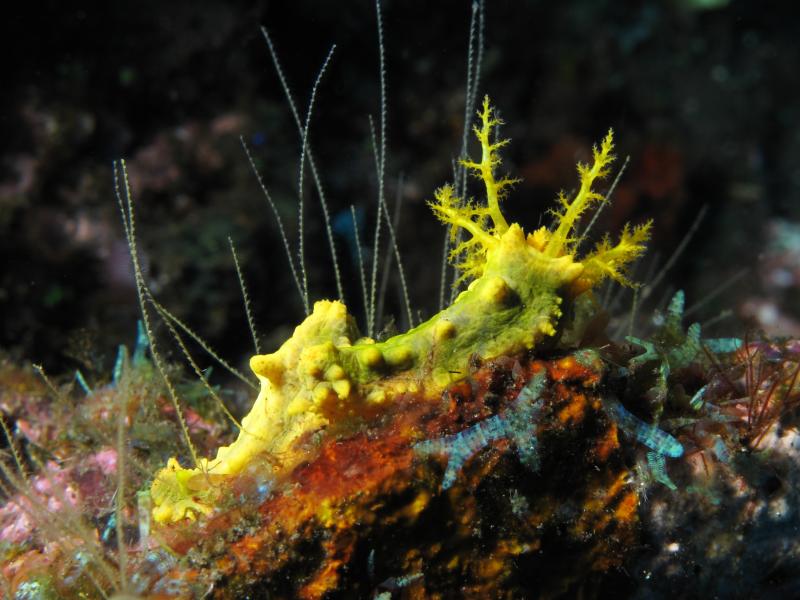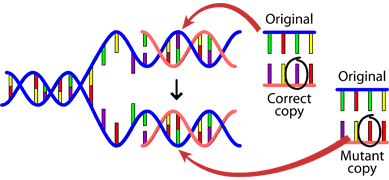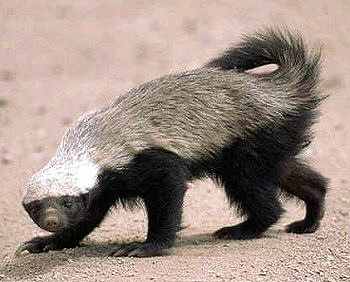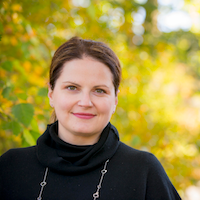One of the common objections to evolution goes something like this: “If evolution is true, then every living thing got here by random chance. But I’m too awesome (or this tree is too awesome, or this animal is too awesome, or this bacterial flagellum is too awesome, etc.) to have been brought about by random chance. Ergo, evolution isn’t true. So there.” Awesomeness is as awesomeness does, I suppose, but the crux of the argument—that evolution is random—is the topic of today’s post.
Misconception: Evolution is random.
Correction: Evolution is neither entirely random nor entirely non-random.
First, let me remind you that no matter how awesome you are, your awesomeness isn’t certified by evolution. The scala naturae—the ladder of nature, or the Great Chain of Being—has come up in several previous posts. Originally, it was a device to help philosophers as far back as Aristotle understand and organize the living world—plants on the bottom, then animals, then, atop it all, humans in all their awesomeness. (It was usually extended to cover the entire universe, with minerals and the like under the plants and with the angels and finally God at the apex.) So it’s a pre-evolutionary notion. But it persisted even after the notion of evolution gained widespread acceptance. In later centuries, Haeckel and others interpreted evolution in terms of the scala naturae, claiming that evolution demonstrates a linear, temporal, progression toward perfection.
 Of course, we know that evolution does no such thing. Different organisms are great at different things and there is no scale by which to measure progress. Darwin scribbled in his 1837 notebook, “It is absurd to talk of one animal being higher than another. We consider those, when the cerebral structure/intellectual faculties most developed, as highest. A bee doubtless would when the instincts were.” To give my favorite example, some types of sea cucumbers distract predators by spewing their guts out of their butts and wriggling away. While the predator feasts on their old set of organs, the sea cucumbers go about generating new ones. Now that’s awesome. Humans can’t do that! Who’s to say whether our smarts or the sea cucumbers regenerating guts is “more evolved”? Sea cucumbers probably look at humans and think: Poor dears. They can’t do anything.
Of course, we know that evolution does no such thing. Different organisms are great at different things and there is no scale by which to measure progress. Darwin scribbled in his 1837 notebook, “It is absurd to talk of one animal being higher than another. We consider those, when the cerebral structure/intellectual faculties most developed, as highest. A bee doubtless would when the instincts were.” To give my favorite example, some types of sea cucumbers distract predators by spewing their guts out of their butts and wriggling away. While the predator feasts on their old set of organs, the sea cucumbers go about generating new ones. Now that’s awesome. Humans can’t do that! Who’s to say whether our smarts or the sea cucumbers regenerating guts is “more evolved”? Sea cucumbers probably look at humans and think: Poor dears. They can’t do anything.
So no, evolution has not resulted in a progressive ladder of life; it has formed a sprawling bush. That does not mean, however, that evolution is an entirely random process—though it does have a very important random component: mutation. Mutations are changes in genetic material that produce variation among individuals and thus the raw material for evolution. Mutations can be good, bad, or neutral, but—and this is the key point—the outcome of a mutation is not correlated to the environment. In other words, being in a particular environment does not generate mutations that will be helpful in that environment. The environment can influence the rate of mutation (lots of radiation will tend to spark lots of mutation, for example), but it cannot influence the outcome. Organisms do not get the mutations they need to be successful—they get what they get.

Mutations in DNA can affect the traits of an organism via the processes of transcription and translation (anyone having Biology 101 flashbacks?), which generate proteins, which in turn affect everything from body plan patterning in development to hair color and behavior. Mutations can also affect control regions of DNA that regulate gene expression. In this way, the protein produced isn’t itself affected, but how often and when it is produced is. A mutation might have no effect on an organism at all. Perhaps it occurred in a non-coding region of DNA, or perhaps the change just didn’t matter to the survival of the organism. But other mutations will have an effect—either good or bad. If the mutation helps, individuals with the mutation will tend to survive, reproduce, and pass on the mutation to the next generation more frequently than individuals without the mutation. If the mutation is harmful, then those with it will tend to survive, reproduce, and pass on the mutation less frequently. In this way, a population’s gene pool shifts as the proportion of individuals in a population with favorable traits tend to increase over generations—this is natural selection, and natural selection is not random.
 You can see the results of this non-randomness all around you in the adaptations that enable organisms to thrive in different environments—from uncanny camouflage to the ability to withstand bee stings and cobra venom (n.b.: the second link is NSFW for language and Mustelidae). Could these adaptations have come about by chance alone? Absolutely not. But could they have come about by a mix of random mutation and non-random selection? You bet.
You can see the results of this non-randomness all around you in the adaptations that enable organisms to thrive in different environments—from uncanny camouflage to the ability to withstand bee stings and cobra venom (n.b.: the second link is NSFW for language and Mustelidae). Could these adaptations have come about by chance alone? Absolutely not. But could they have come about by a mix of random mutation and non-random selection? You bet.
Mutations aren’t the only source of randomness in evolution, though, as I’ll explain in part 2.
--
Have an idea for a future Misconception Monday or any other kind of post? See some good or bad examples of science communication lately? Drop me an email or shoot me a tweet <at>keeps3.

